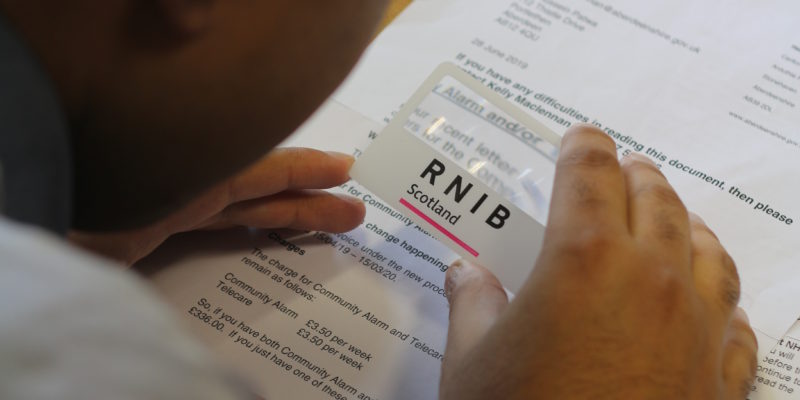
The Royal National Institute of Blind People (RNIB) Scotland is the country’s leading charity working with blind and partially sighted people. We support children and adults with sight loss and help them to live well, campaigning for their rights.
Around 183,000 people live with a significant degree of sight loss in Scotland. This number could eventually double unless we act to prevent avoidable sight loss.
With rates of sight loss expected to rise in Scotland, we need to take a fresh approach to responding to those who rely on health and social care services across the country.
Currently, people experience problems at every stage of their eye care journey and that the impact of sight loss can be significant. From having an initial appointment, to a diagnosis confirmed, support after diagnosis and living well with the condition. People can experience huge distress as demonstrated by these quotes from two people with sight loss:
“The whole world came crushing down around my shoulders; I went downhill very, very quickly”.
“I think there should be less focus on the medical aspect of it all and more on me as a whole person. I am more than a medical condition.”
We therefore need to work collaboratively across Scotland, across the third sector and health and social care, to ensure that information, advice, and support is integrated at every stage of the eye care pathway. We can then change the way eye care services are experienced by people across Scotland to prevent health inequalities.
Over the last two years RNIB, with the wider eye care sector, have been building an evidence base on which to develop an eye care support pathway. From research, mapping the pathway end to end and listening to people with lived experience of sight loss/eye conditions.
The Eye Care Support Pathway has been developed in partnership with health and social care professionals, people with lived experience of eye care services and sight loss, the third sector and professional bodies across the eye care sector. It addresses the pain points – where people experience a problem – and presents the key requirements needed to empower people to actively participate along their eye care journeys.
In total, over 100 pain points have been identified across a typical eye care journey. This may include a lack of information, advice, or support; a delay; a lack of clarity with what happens next; or poor communication.
Using the pain points as a basis for improvement, individual support requirements have been identified to create an eye care support pathway underpinned by three thematic needs. These are:
- understanding my eye care journey.
- understanding my diagnosis.
- having access to practical and emotional support.
A Scotland-wide Eye Care Support Pathway
Through developing a Scotland-wide eye care support pathway our shared ambition is that:
‘Fromthe moment someone realises that “something isn’t quite right” with their sight, through to diagnosis and being able to live confidently – and independently – with their condition, people have access to the information, advice and support they need’.
Through embedding information, advice and support we can together:
- Intervene earlier, freeing up precious NHS and social care resources whilst improving people’s quality of life.
- Provide better, person-centred eye care services with increased engagement, understanding, self-support and self-advocacy at every stage of person’s eye care journey.
Reduce eye health inequalities including reducing the inequity of access to care. - Improve health, wellbeing, and independent living.
- Improve levels of eye health literacy.
- Increase compliance with agreed treatment options and protocols and promote shared decision making.
- Support the reduction in non-attendances in outpatient settings.
- Reduce the impact of eye disease on the Scottish economy through maximising employment and prevention of people leaving work unnecessarily due to eye care and sight loss.
- Provide early and continued support for those waiting to access care and treatment.
We would like to thank everyone for their valuable insights, contributions, and commitment to the development of the eye care support pathway across the UK.
Laura Jones is the NHS Engagement Manager (Scotland) for Royal National Institute of Blind People (RNIB) Scotland
For more information, please visit our website here.


Art work created by the RNIB Scotland Hillside VI Art Group
